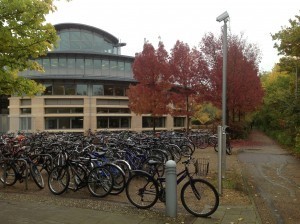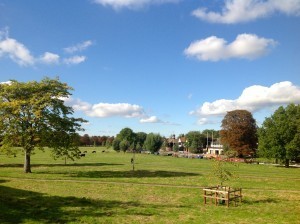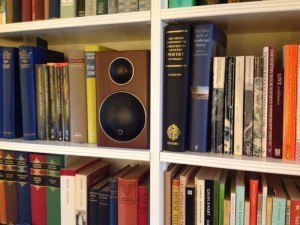Peter Smith's Blog, page 119
October 23, 2012
Set-theoretic excitements to come …

The Moore Library, CMS, Cambridge
My colleague and friend Thomas Forster has posted an intriguing message to the FOM list, and some readers here might be interested. He writes that he is “in the process of assembling funding for a meeting to discuss and broadcast recent developments in NF.” The evolving plan is to have some meetings next year under the auspices of the Isaac Newton Institute (who should be able to fund board and lodging for [at least some?] visitors). Thomas continues “At this stage I envisage making a start in late March … featuring introductory material, minicourses, tutorials, continuing into early April with presentations of recent results and discussions of their implications for foundational projects more generally.” My lips are sealed, for the moment, about the set-theoretic excitements which have prompted this occasion. But watch this space. If you wish to be put on the mailing list for this event, please send an email to tf@dpmms.cam.ac.uk.
(The snap was taken yesterday, just a few yards from the Newton Institute building, looking across the bikes parked outside the Centre for Mathematical Sciences towards the Moore Library there.)
Excitements to come …

The Moore Library, CMS, Cambridge
My colleague and friend Thomas Forster has posted an intriguing message to the FOM list, and some readers here might be interested. He writes that he is “ in the process of assembling funding for a meeting to discuss and broadcast recent developments in NF. ” The evolving plan is to have some meetings next year under the auspices of the Isaac Newton Institute (who might be able to fund board and lodging for at least some visitors). Thomas continues “At this stage I envisage making a start in late March … featuring introductory material, minicourses, tutorials, continuing into early April with presentations of recent results and discussions of their implications for foundational projects more generally.” My lips are sealed, for the moment, about what excitements have prompted this occasion. But watch this space. If you wish to be put on the mailing list for this event, please send an email to tf@dpmms.cam.ac.uk.
(The snap was taken yesterday, just a few yards from the Newton Institute building, looking across the bikes parked outside the Centre for Mathematical Sciences towards the Moore Library there.)
October 12, 2012
Teach yourself logic, #4: Beginning set theory (again)
After my last post, I had second thoughts. Given the number of books on set theory there are out there which are worth a mention at some point or other even in a very selective reading list, it would be much better to divide the appropriate chunk of the Teach Yourself Logic Guide into two sections, one on the elements of set theory, another carrying the story forward.
What do I mean by ‘elements’ here? But ostension, the contents of e.g. Enderton’s The Elements of Set Theory. By description, the construction of numbers systems in set theoretic terms, the development of cardinal and ordinal arithmetic, stuff about the use of axiom(s) of choice. So understood, the elementary stuff stops before we start discussing large-cardinal axiom, or get into showing the Axiom of Choice is consistent with ZF, or the continuum hypothesis is independent of ZFC.
Ok, with the more restricted brief of giving a reading guide to books covering the elements of set theory but not going further, what might a sensible list look like? Well you can see my revised effort as the final section of the current Guide which you can download here.
Do have a look: suggestions and comments are extremely welcome!
October 9, 2012
Teach yourself logic, #4: Beginning set theory
Here, after rather a long gap, is another instalment in the “Teach Yourself Logic” series. For new readers: given the dire state of logic teaching in some grad schools in philosophy (especially in the UK), I’m trying to put together a helpfully annotated reading list. The aim is to give students needing to teach themselves some logic a guide through the daunting yards of books that are (or ought to be) in their university library. The reading list might be helpful to some mathematicians too.
What we’ve covered up to now falls into four sections:
Back to the beginning
Getting to grips with first-order logic
Modal logic
From first-order logic to model theory
And here’s an edited version of the list so far. But I’m now going to jump out of sequence to what is planned to be §9 of the guide, covering set-theory, since that’s what I happen to be thinking about right now. So where to start?
Derek Goldrei, Classic Set Theory (Chapman & Hall/CRC 1996) is written by a lecturer at the Open University in the UK and has the subtitle ‘For guided independent study’. It is as you might expect extremely clear, and it is quite attractively written (as set theory books go!).
Winfried Just and Martin Weese, Discovering Modern Set Theory I: The Basics (American Mathematical Society, 1996). This covers overlapping ground, but perhaps more zestfully and with a little more discussion of conceptually interesting issues, though also it is at some places more challenging (the pace can be uneven). But this is evidently written by enthusiastic teachers, and the book is engaging.
My suggestion some might find a bit surprising, as it is a blast from the past. However, both philosophers and mathematicians ought to appreciate the way it puts the development of our canonical ZFC set theory into some context, and also discusses alternative approaches:
Abraham Fraenkel, Yehoshua Bar-Hillel and Azriel Levy, Foundations of Set-Theory (North-Holland, 2nd edition 1973). This really is attractively readable, and should be very largely accessible at this early stage. I’m not an enthusiast for history for history’s sake: but it really is worth knowing the stories that unfold here.
One intriguing feature of that last book is that it nowhere mentions the idea of the ‘cumulative hierarchy’ — the picture of the universe of sets as built up in a hierarchy of levels, each level containing all the sets at previous levels plus new ones (so the levels are cumulative). This picture — nowadays familiar to every beginner — comes to the foreground in
Michael Potter, Set Theory and Its Philosophy (OUP, 2004). For philosophers (and for mathematicians concerned with foundational issues) this is — at some stage — a ‘must read’, a unique blend of mathematical exposition and conceptual commentary. Potter is presenting not straight ZFC but a very attractive variant due to Dana Scott whose axioms more directly encapsulate the idea of the cumulative hierarchy of sets. However, it has to be said that there are passages which are pretty hard going — sometimes because of the philosophical ideas involved, but sometimes because of unnecessary expositional compression. In particular, at the key point at p. 41 where a trick is used to avoid treating the notion of a level (i.e. a level in the hierarchy) as a primitive, the definitions are presented too quickly, and I know that real beginners can get lost. However, if you have read Just and Weese in particular, you should be able to work out what is going on and read on past this stumbling block.
The books mentioned so far don’t mention but don’t treat (1) independence and consistency results, and though Potter mentions (2) large cardinals, again this is without any development. For a first look at (1), a possibility is
Keith Devlin The Joy of Sets (Springer, 2nd end. 1993). This is again well written, but goes significantly faster than Goldrei or Just/Weese, Chs 1–3 giving a fast track coverage of some of the material in those books. Later chapters in this compact book introduce more advanced material. In particular, Ch. 5 discusses Gödel’s notion of constructible sets, Ch. 6 uses “Boolean valued” sets to prove the independence of the Continuum Hypothesis, and Ch. 7 considers what happens if you allow non-well-founded sets (infinite downward membership chains). But all this is done pretty speedily, which may or may not appeal.
But you could well jump over Devlin and go straight to a more comprehensive treatment of independence proofs, the self-selecting
Kenneth Kunen Set Theory: An Introduction to Independence Proofs (North Holland, 1980), rewritten as his Set Theory* (College Publications, 2011). The first version is a modern classic, used in many university courses: the new version is a timely update and — on a fairly brief inspection — looks to have all the virtues of the earlier version, but acknowledging thirty years of progress.
And then of course — if you’ve got the set-theoretic bug — the modern bible awaits you in the form of the rather monumental
Thomas Jech, Set Theory: The Third Millenium Edition (Springer, 2003).
Which is more than enough to be getting on with!
However, as an afterthought in small print for the list, we might usefully add a handful of other books that seem to me of particular interest for one reason or another. These could all be read after Goldrei or Just/Weese before or alongside Kunen. In no special order
Thomas Forster, Set Theory with a Universal Set: Exploring an Untyped Universe (OUP, 2nd end. 1995). Focuses on Quine’s NF and related systems. It is worth knowing something about alternatives to ZFC.
Thomas Jech, The Axiom of Choice* (North-Holland, 1973: reprinted by Dover Books 2008). Readable, attractively short, and will tell you about a variety of constructions (including Fraenkel-Mostowski models and Cohen forcing).
Raymond Smullyan and Melvin Fitting, Set Theory and the Continuum Problem* (OUP 1996, revised edition by Dover Books 2010). Famously lucid authors trying to make hard proofs accessible and doing a good job.
If you were intrigued by some of the historical material in Fraenkel/Bar-Hillel/Levy then you should enjoy José Ferreirós, Labyrinth of Thought: A History of Set Theory and its Role in Modern Mathematics (Birkäuser, 2007). This is slightly mistitled — it is the history of early set theory, stopping around Gödel’s relative consistency results. But an interesting read.
I could go on! Should I have mentioned Moschovakis’s nice Notes on Set Theory earlier on in the main list? Added Bell on Boolean-Valued Models to the small print?? Even added Halbeisen’s interesting new book on Combinatorial Set Theory??? But let me pause here.
Suggestions please!
Added I surely should have mentioned at the outset Enderton’s book Elements of Set Theory (what a pity it isn’t available as a cheap Dover reprint!). And I am beginning to wonder about splitting this burgeoning section of the list into two sections — ‘Beginning Set Theory’ and ‘Continuing Set Theory”.
October 8, 2012
Postcard from Cambridge

Cambridge, Midsummer Common
Sometimes, at the beginning of the academic year, Cambridge goes into a grey sulk. But this year the weather has been wonderful, and walking or cycling across the common into town has been a delight. (Note the Red Poll cattle, back grazing a few hundred yards from the centre of town, shortly no doubt to appear at the Sunday market …)
OK: back to business! Having been distracted from other projects by getting Gödel Mark II off to press, I’m slowly getting into thinking about ordinals again now I’m back from Berlin. So (although the intended book is provisionally titled Ordinals Without Sets) I’m doing an amount of set-theoretic homework. No doubt I am doing far more than I really need, somewhat painfully scraping off years of rust. But I’m sure this will be Very Good For Me (gym for the mind). And anyway, I’ve promised to go to a set-theory reading group the estimable Thomas Forster is running this term.
I’ve also just started to get back to that stuttering project of putting together a Teach Yourself Logic reading list, and will post the next instalment of that very shortly. Here in the meantime is an updated version of the list so far.
September 26, 2012
Postcard from Berlin

Portrait of a Young Woman, Rogier van der Weyden
We have been staying in Berlin with The Daughter (my first visit there since I crossed Europe in an A30 van with two friends as a student, driving through Checkpoint Charlie en route to Warsaw … but that was in another life). The Daughter’s temporary apartment is in old East Berlin, fairly central, near the Senefelderplatz U-bahn station. Rents are still low in Berlin, so little shops and small local cafés with just a handful of tables abound. And the cafés, at least, seem to be thriving: all different, offering different little menus, run by very welcoming young people. We’ve had some great coffee, nice meals, and love the atmosphere. And we much regret the lack of anything comparable here in Cambridge. It has been warm enough to sit at outside tables often enough, usually accompanied by crowds of chattering sparrows pecking at dropped crumbs (a much rarer sight in England than they used to be).
Getting around Berlin on trams and the U-bahn is fun (very cheap, very efficient — city public transport as it should be). And we’ve been bowled over by the museums and galleries: in six days we’ve perhaps had our fill for this trip, but we’ll have to be back soon. The Pergamon Museum is, as everyone says, amazing. But we’ve also especially enjoyed a couple of visits to the stunning collection of paintings at the Gemäldegalarie (and on both occasions the gallery seemed almost empty, at least by the oppressive standards of the National Gallery in London). You can see something of those paintings in the Google Art Project pages here. Simply wonderful.
September 14, 2012
Whoosh …!!!
No, no, that isn’t the sound of another deadline flying by. Can’t you hear the difference? It’s the cheerier noise made as a weighty email takes off and departs to the publisher, freighted with a PDF of Gödel Mark II.
Of course, that’s not the end of the matter. The wheels at CUP will start turning, and eventually I’ll get a report from their proof-reader, and have to get back to tinkering again. But for a number of weeks I can put that book aside. I feel oddly bereft. I’ll have to get working on another …
September 4, 2012
With a little help from my friends
All editing and no play makes Jack a very dull blogger. Sorry! Must do better. But I’ve promised to get the Gödel book off to CUP in ten days, so I’m doing a last read-through, mostly obsessing about minutiae, though I also have to sort a few minor bugs in the last chapters caught by sharp readers. And that is rather all-consuming.
Still, I can see light at the end of the tunnel. (Though it is probably a bit early for you all to form an orderly queue at the bookshop: publication about April, I think.) This last phase of writing has been a lot more enjoyable and less stressful than it might have been because of the input and warm encouragement I have had from over forty kind people in response to my invitation here and elsewhere to help proof-read chunks of the book. With most of the responses in, that has worked quite wonderfully well. Most chapters have now been looked at by three readers, with different readers bringing a different mix to the party. Some are particularly eagle-eyed at spotting typos, some very helpful about picking up sentences that don’t read well to non-native English speakers, some are good at finding nice ways of rephrasing to avoid possible misunderstanding, some have helpful suggestions about when yet-another-reference or yet-another-footnote would in fact be a good idea, some are stern about ‘that’ vs ‘which’, some have an enviably secure grasp of the True Difference Between a Colon and a Semi-colon, and so it goes. And everyone has evidently put a lot of care into their close-reading.
The proof-readers have been a very mixed bunch, lots of grad students of course, but also senior undergraduates, established professors, and a good sprinkling of ‘amateurs’ who have done some logic in the past and are now out of academia. And (perhaps useful info for anything thinking of emulating this exercise in crown-sourcing the fine-tuning of a logic text), there seems to have been zero correlation between official status and the giving of particularly valuable comments.
I’m really grateful to everyone. All shall have prizes. Or at least, have their name in lights in the book.
August 19, 2012
The proof-reader’s playlist
It is very cheering how many generous, eagle-eyed, and logically clued-up people there are out there, who have volunteered to help out with the proof reading of parts of Gödel Mark II, with only the smallest of bribes as an incentive. Maybe it isn’t quite so cheering to note how few come from the UK. And it is even less cheering to have one’s bad mistakes pointed out. Typos I can live with: but thinkos where a proof gets fouled up, for example, aren’t so great to find. Still, it is a considerable relief to have such glitches caught at this stage in the process.  I have been listening to a lot of baroque/early classical music as I hack through lists of corrections and suggestions for stylistic improvement. By the way, I don’t think I’ve mentioned here my purchase a few months ago of some entry-level hifi — not the really high-end stuff that serious buffs go for, but still a heck of a lot better than what it replaced. There are size constraints dictating the sort of speakers I could go for: so I have a pair of Monitor Audio Radius R90HD mini speakers sitting in the bookshelves, with a matching R360HD subwoofer sitting on the floor. (That’s an odd phenomenon, isn’t it? For classical music, the subwoofer mostly emits quiet growls and rumbles — yet it opens up the sound enormously.) And then I bought an Arcam solo mini amplifier/CD player/radio (again, physical size was an issue, though in this case not a deal-breaker). As it happens, all made within a few miles of Cambridge. I am totally delighted, and have nothing but praise for the local branch of Sevenoaks Sound and Vision who gently advised and let me listen to a number of systems at considerable length. Anyway, here are a few recommendations for music to do proof-corrections to!
I have been listening to a lot of baroque/early classical music as I hack through lists of corrections and suggestions for stylistic improvement. By the way, I don’t think I’ve mentioned here my purchase a few months ago of some entry-level hifi — not the really high-end stuff that serious buffs go for, but still a heck of a lot better than what it replaced. There are size constraints dictating the sort of speakers I could go for: so I have a pair of Monitor Audio Radius R90HD mini speakers sitting in the bookshelves, with a matching R360HD subwoofer sitting on the floor. (That’s an odd phenomenon, isn’t it? For classical music, the subwoofer mostly emits quiet growls and rumbles — yet it opens up the sound enormously.) And then I bought an Arcam solo mini amplifier/CD player/radio (again, physical size was an issue, though in this case not a deal-breaker). As it happens, all made within a few miles of Cambridge. I am totally delighted, and have nothing but praise for the local branch of Sevenoaks Sound and Vision who gently advised and let me listen to a number of systems at considerable length. Anyway, here are a few recommendations for music to do proof-corrections to!
Marc-André Hamelin playing Haydn piano sonatas (so far I have his first and third double-CDs: they really are quite extraordinarily good as all the reviews say, better — I think — even than Brendel’s classic discs: hugely recommended).
Those, however, are so wonderful as to be a bit distracting! Perhaps more conducive to concentration are the terrific discs from Il Giardino Armonico of Vivaldi’s Concerti da camera. There are four in the series: sad completist that I am, I’ve much enjoyed them all tootling away in the background. Very cheap too, through sellers via the Amazon site.
Great performances too — by Andrew Manze in particular — of the Albinoni Op. 9 Concerti from Christopher Hogwood and the Academy of Ancient Music.
More Vivaldi. I haven’t yet bought Rachel Podger’s new discs, which I must do! But I have been listening again to her wonderful La Stravaganza: terrific playing of such life-affirming music.
And then I have listening again to early discs in the quite inexhaustible complete Haydn symphonies conducted by Adam Fischer. (What do you mean you haven’t got that boxed set? For heaven’s sake proceed immediately to Amazon and hit the button: 33 disks for the price of a tolerable meal out …)
OK, time to select another disc and get back to proof-reading!
August 8, 2012
The kindness of strangers
I’ve had a wonderful response to the invitation here to proof-read/comment on chunks of Gödel Mark II, enough to ensure that every chapter will be covered at least a couple of times. There was a (very) small bribe attached: but quite a few made friendly offers saying that they’d like to join in as they had enjoyed the first edition. Which is very nice to know! Corrections and suggestions from these new recruits assigned early chapters to review are already beginning to arrive, to add to those from some previous much valued correspondents, as I finishing tinkering with the last chapters. Just terrific. It’s going to be a very busy few weeks ahead, but the book will end up a lot better for it.
The possibility of this kind of supportive exchange via the internet, and the availability of wonderful resources like mathoverflow.net of math.stackexchange.com, make trying to write a logic book in 2012 so very much more enjoyable (and a much less stressful experience) than even ten years ago. Many thanks to all my virtual logical colleagues out there!



